A new briefing paper released by BankTrack and the B4Ukraine coalition shows that Raiffeisen Bank International (RBI) is still failing to meaningfully address the human rights implications…
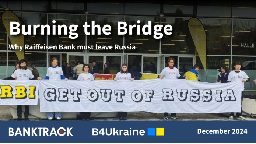
Hier ist die Analyse (pdf) auf Deutsch.
Hier ist die Analyse (pdf) auf English.
Fast drei Jahre nach dem Krieg in der Ukraine verdient der österreichische Kreditgeber weiterhin Milliarden in Russland, während seine Pläne für den Ausstieg aus dem Land noch unklarer als je zuvor sind, sagt eine gemeinsame Analyse von BankTrack und B4Ukraine.
-
Fast drei Jahre nach der russischen Invasion in die Ukraine im Februar 2022 zeigen die Ergebnisse, dass sowohl die Vermögenswerte als auch die Gewinne der russischen RBI-Tochtergesellschaft über dem Vorkriegsniveau liegen.
-
Insbesondere zeigt das Papier, dass die Raiffeisenbank weiterhin Zahlungsdienste und Steuerbeiträge leistet an Russland und damit einem wesentlichen Beitrag zur russischen Kriegsanstrengung leistet. Die Bank hat seit Beginn des Krieges mehr als 1,3 Milliarden Euro an Steuerzahlungen geleistet, wobei auch die jährlichen Zahlungen deutlich höher sind als vor der Invasion.
-
Diese Ergebnisse zeigen, dass der Kreml und bei seinen Kriegsanstrengungen weiterhin erheblich von der Präsenz der RBI im Land profitiert (etwa 40% des russischen Staatshaushalts sind für militärische Zwecke bestimmt).
-
Wie der Bericht feststellt, übersteigen die Größe und der Umfang der russischen Operationen von RBI jene aller anderen westlichen Banken zusammen.
Die Analyse wirft Zweifel am lang versprochenen Rückzug von Raiffeisen aus Russland auf. Seit Februar 2022 haben die meisten westlichen Bankengruppen ihre russischen Geschäfte verkauft oder geschlossen, Die RBI hat öffentlich über ihre Absicht diskutiert, ihre russische Tochtergesellschaft zu verkaufen und Russland zu verlassen. Doch der Fortschritt ist extrem langsam. Obwohl ein Verkauf seiner russischen Einheit seit September 2024 de facto unmöglich ist, hat die RBI immer noch nicht ausreichend alternative Optionen für einen Rückzug aus dem Land untersucht, heisst es in dem Papier.
A new briefing paper released by BankTrack and the B4Ukraine coalition shows that Raiffeisen Bank International (RBI) is still failing to meaningfully address the human rights implications…
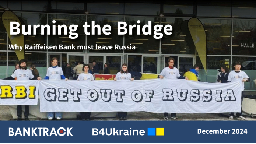
Nearly three years into the war on Ukraine, the Austrian lender continues to make billions in Russia, while its plans for exiting the country remain more unclear than ever.
Here is the paper (pdf) in English.
Here is the paper (pdf) in German.
A new briefing paper released by BankTrack and the B4Ukraine coalition shows that Raiffeisen Bank International (RBI) is still failing to meaningfully address the human rights implications of its operations in Russia. The briefing draws together nearly three years of data and investigations into RBI, the largest international bank still operating in Russia. Nearly three years after Russia launched its full-scale invasion of Ukraine, results indicate that the values of both the assets and the profits of RBI’s Russian subsidiary remain higher than pre-war levels, while the bank continues to stall on its commitment to exit Russia.
Most notably, the briefing shows that Raiffeisenbank Russia continues to provide payment services and tax contributions that risk materially contributing to the Russian war effort. The bank is found to have made more than €1.3 billion in tax payments since the beginning of the war, with annual payments also remaining significantly higher than pre-invasion levels. These findings indicate that the Russian government and its war effort continue to benefit significantly from RBI’s presence in the country (roughly 40% of Russia’s government budget is earmarked for military purposes).
[...]
These findings provide crucial background to the Russian government’s classification of RBI as one of just two “systemically important” foreign banks remaining in Russia. As the report notes, the size and scope of RBI’s Russian operations exceed those of all other remaining Western banks put together. This outsized presence continues to sustain the Russian wartime economy.
[...]
Bringing Taiwan to the World and the World to Taiwan
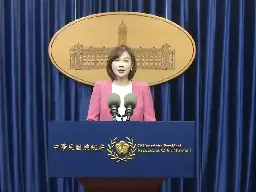
cross-posted from: https://beehaw.org/post/17526254
> The Presidential Office yesterday called on China to stop all “provocative acts,” saying ongoing Chinese military activity in the nearby waters of Taiwan was a “blatant disruption” of the “status quo” of security and stability in the Indo-Pacific region. > > Defense officials said they have detected Chinese ships since Monday, both off Taiwan and farther out along the first island chain. They described the formations as two walls designed to demonstrate that the waters belong to China. > > [...] > > Taiwan has been expecting drills following stops by President William Lai (賴清德) in Hawaii and the US territory of Guam during an overseas trip to diplomatic allies in the Pacific last week. > > Presidential Office spokeswoman Karen Kuo (郭雅慧) in a statement said that China’s military actions were a “blatant disruption” of regional stability and Beijing should immediately stop all “provocative acts.” > > She said that it is customary for presidents to go overseas and that “Taiwan’s normal international exchanges with other countries are not an excuse for China’s provocations.” > > Meanwhile, the Taiwan's Ministry of Foreign Affairs (MOFA) yesterday demanded China cease its military intimidation and “irrational behavior” that endangers regional peace and stability. >
[Edit typo.]
Bringing Taiwan to the World and the World to Taiwan
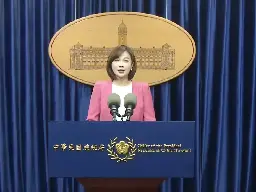
The Presidential Office yesterday called on China to stop all “provocative acts,” saying ongoing Chinese military activity in the nearby waters of Taiwan was a “blatant disruption” of the “status quo” of security and stability in the Indo-Pacific region.
Defense officials said they have detected Chinese ships since Monday, both off Taiwan and farther out along the first island chain. They described the formations as two walls designed to demonstrate that the waters belong to China.
[...]
Taiwan has been expecting drills following stops by President William Lai (賴清德) in Hawaii and the US territory of Guam during an overseas trip to diplomatic allies in the Pacific last week.
Presidential Office spokeswoman Karen Kuo (郭雅慧) in a statement said that China’s military actions were a “blatant disruption” of regional stability and Beijing should immediately stop all “provocative acts.”
She said that it is customary for presidents to go overseas and that “Taiwan’s normal international exchanges with other countries are not an excuse for China’s provocations.”
Meanwhile, the Taiwan's Ministry of Foreign Affairs (MOFA) yesterday demanded China cease its military intimidation and “irrational behavior” that endangers regional peace and stability.
[Edit typo.]
VPNs reportedly didn't help citizens bypass restrictions
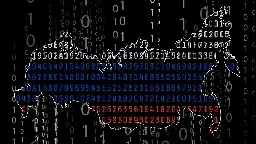
Russia restricted foreign internet access across several regions over the weekend to test its national infrastructure.
Residents of the affected regions couldn't access both foreign and local apps, including the likes of YouTube (one of the last Western social media platforms still available in Russia), Google, WhatsApp, and Telegram – The Record reported.
As per local reports, not even virtual private network (VPN) apps managed to help citizens bypass internet restrictions in what looks like a new phase of online censorship for the country.
"This event is crucial in the possible evolution of online censorship in Russia because it shows what's technically possible – a very limited internet experience where most common things simply don't work," a technical expert from the Russian digital rights group Roskomsvoboda told TechRadar.
According to reports, Runet trials mostly affected residents living in areas populated by ethnic minorities, such as Chechnya, Dagestan, and Ingushetia.
[...]
A new phase of Russian censorship
Russian censorship is clearly getting tougher, and visitors and residents are left with fewer means to overcome restrictions.
While the best VPN apps have become a crucial resource for people in Russia struggling to access international news and other blocked websites, 2024 has seen the Kremlin double down against Russia's VPN usage.
For starters, a new law enforced in March now criminalizes the spread of information about ways to circumvent internet restrictions – VPNs included.
[...]
China's ICCs reshape global propaganda via targeted messaging, social media, and influence networks to amplify the Communist Party's voice globally.

cross-posted from: https://beehaw.org/post/17509380
> Archived > > Here is the full report (pdf, 28 pages) > > China is rapidly advancing its global propaganda strategies through international communication centers (ICCs), with over 100 centers established since 2018 — most since 2023. These centers aim to amplify the Chinese Communist Party's (CCP) voice on the international stage, targeting specific audiences with tailored messaging (a strategy known as “precise communication”). ICCs coordinate local, national, and international resources to build China's image, share political narratives, and promote economic partnerships. > > By leveraging inauthentic social media amplification, foreign influencers, and collaborations with overseas media, ICCs advance China’s multi-layered propaganda approach. For instance, Fujian's ICC reportedly manages TikTok accounts targeting Taiwanese audiences, likely including a covert account that is highly critical of the Taiwan government called Two Tea Eggs. On YouTube, the same ICC promotes videos of Taiwanese individuals praising China. These centers are strategically positioned to promote China's interests during geopolitical crises, despite challenges like limited credibility and resource constraints. > > [...] > > ICCs employ various tactics to achieve their objectives. Social media operations form a core component of their strategy, with thousands of accounts active across platforms like Facebook, YouTube, and TikTok. Many of these accounts lack transparency about their state affiliations, enabling covert influence campaigns. Additionally, ICCs leverage foreign influencers and “communication officers” to amplify China’s narratives through user-generated content, vlogs, and experiential propaganda. > > Collaboration with overseas media organizations further enhances ICCs' reach and legitimacy. Through actions like organizing foreign journalist visits to China, ICCs create an impression of organic coverage and offer an alternative to Western narratives. These partnerships — reportedly established in Australia, Brazil, Cambodia, Egypt, France, Japan, Russia, the United States, and elsewhere — are complemented by localized propaganda activities that align with China’s economic and geopolitical interests. > > [...]
China's ICCs reshape global propaganda via targeted messaging, social media, and influence networks to amplify the Communist Party's voice globally.

Here is the full report (pdf, 28 pages)
China is rapidly advancing its global propaganda strategies through international communication centers (ICCs), with over 100 centers established since 2018 — most since 2023. These centers aim to amplify the Chinese Communist Party's (CCP) voice on the international stage, targeting specific audiences with tailored messaging (a strategy known as “precise communication”). ICCs coordinate local, national, and international resources to build China's image, share political narratives, and promote economic partnerships.
By leveraging inauthentic social media amplification, foreign influencers, and collaborations with overseas media, ICCs advance China’s multi-layered propaganda approach. For instance, Fujian's ICC reportedly manages TikTok accounts targeting Taiwanese audiences, likely including a covert account that is highly critical of the Taiwan government called Two Tea Eggs. On YouTube, the same ICC promotes videos of Taiwanese individuals praising China. These centers are strategically positioned to promote China's interests during geopolitical crises, despite challenges like limited credibility and resource constraints.
[...]
ICCs employ various tactics to achieve their objectives. Social media operations form a core component of their strategy, with thousands of accounts active across platforms like Facebook, YouTube, and TikTok. Many of these accounts lack transparency about their state affiliations, enabling covert influence campaigns. Additionally, ICCs leverage foreign influencers and “communication officers” to amplify China’s narratives through user-generated content, vlogs, and experiential propaganda.
Collaboration with overseas media organizations further enhances ICCs' reach and legitimacy. Through actions like organizing foreign journalist visits to China, ICCs create an impression of organic coverage and offer an alternative to Western narratives. These partnerships — reportedly established in Australia, Brazil, Cambodia, Egypt, France, Japan, Russia, the United States, and elsewhere — are complemented by localized propaganda activities that align with China’s economic and geopolitical interests.
[...]
The Uyghur Human Rights Project (UHRP) observes the fourth annual Uyghur Genocide Recognition Day, calling on governments, businesses, and civil society to strengthen accountability measures and deliver justice for the Uyghur people.

cross-posted from: https://beehaw.org/post/17493228
> Archived > > The Uyghur Human Rights Project (UHRP) observes the fourth annual Uyghur Genocide Recognition Day, calling on governments, businesses, and civil society to strengthen accountability measures and deliver justice for the Uyghur people. > > “Uyghur Genocide Recognition Day is a reminder of what is at stake—Uyghurs continue to face cultural erasure,” said Omer Kanat, UHRP Executive Director. “Words of recognition must be backed by concrete, enforceable policies to end complicity in these atrocities.” > > The Chinese government’s ongoing repression includes mass arbitrary detention, forced labor, family separation, religious persecution, and the erasure of Uyghur identity and culture. Uyghur forced labor remains embedded in global supply chains, implicating major industries and corporations. Despite growing consumer awareness, transparency and enforcement efforts remain insufficient. > > Global recognition of the Uyghur genocide has grown since the Uyghur Tribunal’s findings. Similar determinations have been made by the U.S. government and legislative bodies in Canada, the UK, the Netherlands, Belgium, France, Lithuania, Czechia, and Ireland. > > The United Nations has also raised alarms. An assessment by the Office of the High Commissioner for Human Rights (OHCHR) found China may be committing crimes against humanity, while the UN Special Rapporteur on modern slavery found that some instances of forced labor may amount to enslavement as a crime against humanity. In 2021, UHRP led 50 genocide prevention organizations and experts in who said the treatment of Uyghurs “meet[s] the threshold of acts constitutive of genocide, core international crimes under the Genocide Convention.” > > UHRP urges governments to enforce import bans on goods produced with forced Uyghur labor, and strengthen sanctions against Chinese officials responsible for human rights abuses. UHRP also calls on companies to conduct robust due diligence on supply chains and to end business relationships with entities linked to forced labor. > > UHRP calls on governments to acknowledge their responsibilities under the 1948 UN Genocide Convention, and take all necessary steps to end the ongoing Uyghur genocide. >
Exports YoY in China decreased to 6.70 percent in November from 12.70 percent in October of 2024. This page includes a chart with historical data for China Exports YoY.
cross-posted from: https://beehaw.org/post/17493220
> Russia has imposed a 55.65% tariff on China-made furniture parts, a trade war salvo that has raised hard new questions about Moscow and Beijing’s “no limits” partnership, as per Asia Times, a media outlet owned by Asia Times Holdings Limited, a Hong Kong company holding multimedia and public relations company, which followed a story first reported by U.S. magazines Forbes. The Asia Times sees reason to suspect " the first salvo Russia-China trade war", as the paper writes. > > Since autumn 2024, the customs department of Russia’s eastern city of Vladivostok has re-categorized furniture sliding rail components as bearing types, resulting in a drastic increase in tariffs from zero to 55.65%. The city now handles 90% of China’s furniture parts imports into Russia, the paper writes. > > The Association of Furniture and Woodworking Enterprises of Russia (AMDPR) said the new tariff would bankrupt Russian importers of furniture components and create an additional 15% cost for local furniture makers. > > AMDPR president Alexander Shestakov said importing a finished piece of furniture, which is only subject to a 9-12% tariff, is now more profitable than producing it domestically. He said the targeted components are currently not produced in Russia, which imports about US$1.3 billion of these furniture parts annually, mainly from China. > > He added that furniture parts importers now must pay up to 2 to 2.5 million rubles ($19,969 to $24,962) worth of tariffs for each container, causing many to send them back to China rather than take delivery. > > The move comes amid a troubling Chinese economy and slowing growth of the Asian country's exports which grew by 6.7% year-on-year in November 2024, missing market forecasts of 8.5% and sharply deteriorating from a more than two-year high of 12.7% surge in the previous month, reflecting ongoing trade tensions with the West.
The Uyghur Human Rights Project (UHRP) observes the fourth annual Uyghur Genocide Recognition Day, calling on governments, businesses, and civil society to strengthen accountability measures and deliver justice for the Uyghur people.

The Uyghur Human Rights Project (UHRP) observes the fourth annual Uyghur Genocide Recognition Day, calling on governments, businesses, and civil society to strengthen accountability measures and deliver justice for the Uyghur people.
“Uyghur Genocide Recognition Day is a reminder of what is at stake—Uyghurs continue to face cultural erasure,” said Omer Kanat, UHRP Executive Director. “Words of recognition must be backed by concrete, enforceable policies to end complicity in these atrocities.”
The Chinese government’s ongoing repression includes mass arbitrary detention, forced labor, family separation, religious persecution, and the erasure of Uyghur identity and culture. Uyghur forced labor remains embedded in global supply chains, implicating major industries and corporations. Despite growing consumer awareness, transparency and enforcement efforts remain insufficient.
Global recognition of the Uyghur genocide has grown since the Uyghur Tribunal’s findings. Similar determinations have been made by the U.S. government and legislative bodies in Canada, the UK, the Netherlands, Belgium, France, Lithuania, Czechia, and Ireland.
The United Nations has also raised alarms. An assessment by the Office of the High Commissioner for Human Rights (OHCHR) found China may be committing crimes against humanity, while the UN Special Rapporteur on modern slavery found that some instances of forced labor may amount to enslavement as a crime against humanity. In 2021, UHRP led 50 genocide prevention organizations and experts in who said the treatment of Uyghurs “meet[s] the threshold of acts constitutive of genocide, core international crimes under the Genocide Convention.”
UHRP urges governments to enforce import bans on goods produced with forced Uyghur labor, and strengthen sanctions against Chinese officials responsible for human rights abuses. UHRP also calls on companies to conduct robust due diligence on supply chains and to end business relationships with entities linked to forced labor.
UHRP calls on governments to acknowledge their responsibilities under the 1948 UN Genocide Convention, and take all necessary steps to end the ongoing Uyghur genocide.
Exports YoY in China decreased to 6.70 percent in November from 12.70 percent in October of 2024. This page includes a chart with historical data for China Exports YoY.
Russia has imposed a 55.65% tariff on China-made furniture parts, a trade war salvo that has raised hard new questions about Moscow and Beijing’s “no limits” partnership, as per Asia Times, a media outlet owned by Asia Times Holdings Limited, a Hong Kong company holding multimedia and public relations company, which followed a story first reported by U.S. magazines Forbes. The Asia Times sees reason to suspect " the first salvo Russia-China trade war", as the paper writes.
Since autumn 2024, the customs department of Russia’s eastern city of Vladivostok has re-categorized furniture sliding rail components as bearing types, resulting in a drastic increase in tariffs from zero to 55.65%. The city now handles 90% of China’s furniture parts imports into Russia, the paper writes.
The Association of Furniture and Woodworking Enterprises of Russia (AMDPR) said the new tariff would bankrupt Russian importers of furniture components and create an additional 15% cost for local furniture makers.
AMDPR president Alexander Shestakov said importing a finished piece of furniture, which is only subject to a 9-12% tariff, is now more profitable than producing it domestically. He said the targeted components are currently not produced in Russia, which imports about US$1.3 billion of these furniture parts annually, mainly from China.
He added that furniture parts importers now must pay up to 2 to 2.5 million rubles ($19,969 to $24,962) worth of tariffs for each container, causing many to send them back to China rather than take delivery.
The move comes amid a troubling Chinese economy and slowing growth of the Asian country's exports which grew by 6.7% year-on-year in November 2024, missing market forecasts of 8.5% and sharply deteriorating from a more than two-year high of 12.7% surge in the previous month, reflecting ongoing trade tensions with the West.
Yeah, or the West would have reacted accordingly already in 2014.
Bringing Taiwan to the World and the World to Taiwan
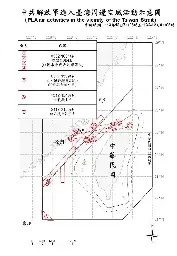
cross-posted from: https://beehaw.org/post/17475699
> Taiwan's Ministry of National Defense (MND) yesterday said China had nearly doubled the number of its warships operating around the nation in the previous 24 hours, ahead of what security sources expect would be a new round of war games. > > China’s military activities come amid speculation Beijing might organize military drills around the nation in response to President William Lai’s (賴清德) recent visit to Pacific allies, including stops in Hawaii and Guam, a US territory. Lai returned from the week-long trip on Friday night. > > Beijing has held two rounds of war games around Taiwan this year, and sends ships and military planes near the nation almost daily.
Bringing Taiwan to the World and the World to Taiwan
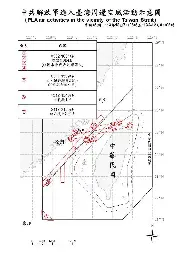
Taiwan's Ministry of National Defense (MND) yesterday said China had nearly doubled the number of its warships operating around the nation in the previous 24 hours, ahead of what security sources expect would be a new round of war games.
China’s military activities come amid speculation Beijing might organize military drills around the nation in response to President William Lai’s (賴清德) recent visit to Pacific allies, including stops in Hawaii and Guam, a US territory. Lai returned from the week-long trip on Friday night.
Beijing has held two rounds of war games around Taiwan this year, and sends ships and military planes near the nation almost daily.
A dark trend has returned to Russia: far-right nationalists sharing videos of brutal attacks on ethnic minorities and other “outsiders.” Each month, at least about 100 new clips of violence against migrants from the Caucasus and Central Asia, LGBTQ+ people, and homeless people appear online. Accordi...
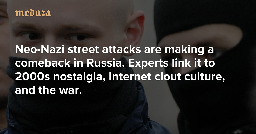
A dark trend has returned to Russia: far-right nationalists sharing videos of brutal attacks on ethnic minorities and other “outsiders.” Each month, at least about 100 new clips of violence against migrants from the Caucasus and Central Asia, LGBTQ+ people, and homeless people appear online. According to experts interviewed by the RFE/RL project Kavkaz.Realii, this revival of neo-Nazi and skinhead culture goes hand in hand with the Russian authorities’ ubiquitous wartime propaganda. Meduza shares an abridged translation of the outlet’s reporting.
The protests sweeping Georgia have now entered their second week. Sparked on November 28, when Prime Minister Irakli Kobakhidze announced that Georgia would halt E.U. accession talks “until the end of 2028,” the anti-government demonstrations have since spread to cities, towns, and even villages acr...
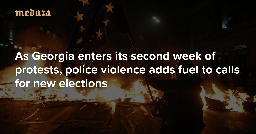
The protests sweeping Georgia have now entered their second week. Sparked on November 28, when Prime Minister Irakli Kobakhidze announced that Georgia would halt E.U. accession talks “until the end of 2028,” the anti-government demonstrations have since spread to cities, towns, and even villages across the country. Protesters are now demanding a rerun of the October 26 parliamentary elections, which saw the ruling Georgian Dream party claim victory amid allegations of vote rigging. [...]
For a firsthand perspective on the first week of protests in Tbilisi, The Beet editor Eilish Hart spoke to Georgian journalist Anna Gvarishvili, head of the Investigative Media Lab at the University of Georgia.
[...]
Anna Gvarishvili: This is also the first time [I’ve seen countrywide protests] on this scale. Usually, there were protests outside of Tbilisi, but [only] in big cities. Now, it’s in almost every little town and village, and that’s something we’ve never seen before. In my hometown, Batumi, people don’t really like protesting. There’s a [running] joke that we never go out to protest. Now, I’m seeing such massive protests in Batumi that I’m shocked. I think the regime should really be afraid of that.
[...]
There’s been inhumane treatment of those who were arrested. Almost everyone who got arrested was brutally and violently beaten. It’s like a series of torture. First, they’re beaten up at the scene of the arrest (as seen in videos and media recordings), then again in the [police vans]. One protester even said that police used pepper spray inside the car and then closed the door while there were people inside who had already been beaten up and arrested.
[...]
Georgians are always like that. Whenever we see dispersals — like during last year’s protests — or disproportionate [force] from the police, we see more people in the streets. It’s been six days now and the protests are only getting larger and larger, and broader in terms of covering the whole country.
[...]
The protests are totally self-organized and spontaneous, and political parties aren’t involved in [leading them]. That’s good, on the one hand, but it’s also bad because the anger needs a political process going on in parallel and we’re not seeing that. President [Saolome] Zourabichvili is trying her best to be a unifying leader for the opposition parties. But it seems like it’s always Zourabichvili trying her best and we don’t see coordinated [actions] from opposition parties yet, unfortunately.
[...]
Do you feel like the protesters are still optimistic at this point?
Yes, absolutely [I think protesters are optimistic]. It’s not [just] about optimism — it’s a peak of defiance. They understand that there’s nothing to lose anymore. This is the final battle, so either we fight or end up as the next Belarus. So yeah, we don’t really have any other option but to be optimistic.
China Launches Operations at Kashgar Kargilik Airport Amid Accusations of Cultural Assimilation
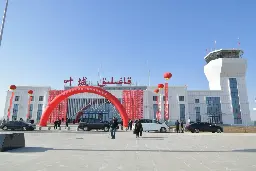
On November 28, 2024, China officially commenced operations at the newly constructed Kashgar Kargilik Mirdei General-Purpose Airport, a project described by Chinese authorities as a “pilot hub for integrated trunk and branch aviation networks.” While state media celebrated the launch as a step towards regional connectivity, Uyghur activists and analysts have criticized it as another tool of assimilation and control in East Turkistan [known also as Xinjiang].
...
Despite China’s claims of development, Uyghur activists have raised concerns that the airport serves Beijing’s broader strategy of cultural and demographic assimilation. “This airport is not designed to benefit Uyghurs but to further solidify China’s control over the region,” said an anonymous Uyghur rights advocate.
Critics argue that the infrastructure projects like this are often used to enhance the mobility of Han Chinese settlers and facilitate the extraction of resources from Uyghur lands. Additionally, they contend that such developments reinforce China’s efforts to centralize administrative control and expand military presence in East Turkistan. A Tool for Sinicization
Observers note that infrastructure projects in Uyghur-majority regions often align with policies aimed at Sinicizing the area. The airport’s emphasis on facilitating government and commercial activities suggests a focus on integrating the region more tightly into China’s national framework, rather than addressing the needs of its Uyghur population.
“This is part of Beijing’s systematic effort to dilute Uyghur identity and accelerate Sinicization,” said another activist. “While they tout development, the Uyghurs are left out, and their cultural heritage continues to be eroded.”
...
That's true. I corrected that now, thanks.
A Russian man went on trial in Finland on Thursday on charges of committing war crimes while commanding a far-right paramilitary unit in eastern Ukraine a decade ago.
The trial of Yan Petrovsky is a rare attempt by prosecutors outside Ukraine to seek justice for victims of alleged war crimes in a conflict that began long before Russia's invasion of Ukraine in February 2022.
On the first day of hearings at Helsinki district court, the Finnish prosecutor demanded life imprisonment for Petrovsky, who is also known as Voislav Torden.
Petrovsky, who was born in 1987, faces five charges of committing war crimes in eastern Ukraine in 2014 and 2015, court documents seen by Reuters show.
Petrovsky, who has been under European Union and U.S. sanctions since 2022, denies all the charges, his lawyer Heikki Lampela told the court.
Petrovsky was detained in Finland at Ukraine's request in 2023 as he tried to travel to France under a false identity. Finland's supreme court later blocked his extradition to Ukraine.
The charges against Petrovsky relate to his activities in Rusich, a paramilitary subunit affiliated to the Wagner mercenary group that fought against Ukraine on the side of Russia-backed separatists in the Luhansk region of eastern Ukraine in 2014, the prosecutor's office said in a statement.
Deputy Prosecutor General Jukka Rappe accuses Petrovsky of co-commanding a group of Rusich fighters who ambushed a group of Ukrainian soldiers after deceiving them by raising a Ukrainian flag at a road block on Sept. 5, 2014, killing 22 and seriously wounding four.
As an addition to the article: Douyin, the Chinese version of the Western TikTok, might work in a different way. As a study regarding visual propaganda of Douyin accounts of Chinese central and local news agencies on China's Douyin found in May 2024:
The results [of the research] delineate a divergence in focus between central and local news agencies: while the former prioritizes content related to the military, police, and firefighting, the latter emphasizes “livelihood warmth” topics. Central agencies predominantly feature soldiers, police officers, and firefighters, whereas local agencies portray individuals devoid of explicit political affiliations alongside other influencers. Emotional scrutiny unveils a contrast in strategies, with central agencies predominantly evoking emotions such as anger, disgust, fear, and intolerance, while local agencies employ anticipation, acceptance, and respect. This investigation underscores the profound influence of political authority within China’s propaganda framework, shaping both the substance and emotional resonance of political short videos within a hierarchical paradigm [...]
Owing to their distinct positions within the hierarchical framework and their varying areas of jurisdiction, local government media at each level exhibit more pronounced hierarchical disparities in their propaganda compared to the central government. In general, the closer the themes and visual characteristics are to “Military, the police, and firefighting”, the less distinguishable they are from central media. Conversely, the more they focus on “People’s livelihood and warmth”, the more likely local governments are to adopt innovative promotional strategies concerning “points” while emphasizing regional characteristics. Although the local news agencies more actively produced content on Douyin than did the central news agencies, the central news agencies received more attention from the public.
The Austrian satire magazine 'Die Tagespresse' -comparable maybe to 'The Onion' in the U.S.- is understandably not known for factual reporting.
This week, however, the magazine started a serious research. They did what they called a ‘self-experimentation’ as they described in their magazine:
>"We register [with Chinese platform TikTok] with disposable emails and create nine accounts of fictitious Austrian teenagers [aged 14 to 17] from each of the nine federal states [in Austria]. The app does not require any proof of age or identity."
>"Then we start a screen recording and scroll through the video feed for ten minutes. We forbid ourselves the search function, we like and comment nothing to give the algorithm no information about what we think is good or bad."
>"Only the perfect Chinese code should decide what young Austrians will see."
The article is very long and I don't want to post the whole text here (you will surely find a useful translation), but I provide a summary in English:
-
All 9 Austrian teenagers between 14 and 17 years of age see radical right-wing propaganda, "free home delivered from China," as the magazine writes.
-
The young people see Herbert Kickl, the current leader of the far-right Austrian Freedom Party, the avatar of Jörg Haider, a former right-wing politician who died in a car accident in 2008, and Alice Weidel, the head of the far-right AfD (Alternative for Germany - Alternative for Germany).
-
Russian propaganda arises, too, promoting immigration to Russia: "We offer work, a house, a Russian wife and military training," promises a mock Vladimir Putin to a 15-year-old teenager from Styria, one of Austria’s nine states. Teenagers must apply only at "einbürgerung@kreml.ru".
-
Donald Trump is doing his 'Trump Dance', anti-EU propaganda and pro-Islamic propaganda are as widespread as Quran videos, and, of course, there’s no lack of China’s Xi Jinping.
The magazine writes:
>Fortunately, the self-experiment is already coming to an end, but it gets wild again.
>The algorithm cannot decide whether Elias [one of the names the magazines used for its teenager accounts] should be radicalized to the extreme right or to Islamism. In between, a video of Andrew Tate, who is serving prison time in Romania for alleged human trafficking and wants to take away women’s right to vote, should not be missed. In the end, only more Quran videos emerge, interrupted by two interspersed clips of the Chamber of Labour, which the Socialists apparently try to pull Elias out of Islamism at the last moment. What a photo finish!
The magazine concludes:
>At the end of this self-experimentation, it’s hard to put into words your own feelings while you’re brushing millions of dead brain cells off your shoulders that have been left out of your ears as you scroll through the app. Our brains feel a few million brain cells lighter, the IQ has dropped by 12 points from scrolling. Alcohol and psychotropic drugs don’t help anymore.
>We can’t decide: Should we quote Quran verses and in the name of Allah blow up the Tomorrowland festival? Or join the Catholic church until Putin provides us with a neo-Nazi bride who is Aries in the zodiac sign?
Among the questions now are:
-
Why do Austrian teenagers see this propaganda nonsense and only this propaganda nonsense?
-
What kind of algorithm is this?
-
What is this aiming at?
[Edit for clarity. Second edit for replacing "German satire magazine" by "Austrian" in the first sentence.]
We demand Chinese authorities release Zhang Zhan immediately and end the persecution of journalists.
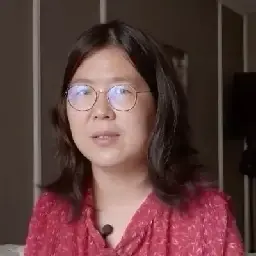
cross-posted from: https://beehaw.org/post/17461260
> Archived > > The rearrest comes just months after she completed a four-year prison sentence for her COVID-19 reporting. Zhang was detained again in August, and her lawyer was also held and intimidated by authorities soon after. > > The rights organization 'Women Press Freedom' has closely followed Zhang’s case since her initial detention in 2020 and has consistently advocated for her release. Despite her brief freedom in May 2024, Zhang remained under surveillance and was summoned by police in June with threats of re-imprisonment for crossing vague “red lines.” Her latest arrest is a grave violation of human rights and part of a broader campaign to silence journalists. > > Women Press Freedom demands Chinese authorities release Zhang Zhan immediately and end the persecution of journalists. "We also call on the international community to take decisive action in holding China accountable for these abuses and to demand the protection of press freedom, " the organization says.
We demand Chinese authorities release Zhang Zhan immediately and end the persecution of journalists.
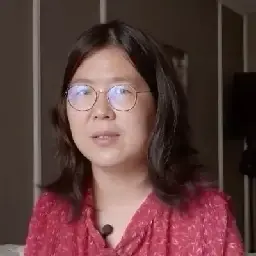
The rearrest comes just months after she completed a four-year prison sentence for her COVID-19 reporting. Zhang was detained again in August, and her lawyer was also held and intimidated by authorities soon after.
The rights organization 'Women Press Freedom' has closely followed Zhang’s case since her initial detention in 2020 and has consistently advocated for her release. Despite her brief freedom in May 2024, Zhang remained under surveillance and was summoned by police in June with threats of re-imprisonment for crossing vague “red lines.” Her latest arrest is a grave violation of human rights and part of a broader campaign to silence journalists.
Women Press Freedom demands Chinese authorities release Zhang Zhan immediately and end the persecution of journalists. "We also call on the international community to take decisive action in holding China accountable for these abuses and to demand the protection of press freedom, " the organization says.
Keine sorge wenn sie Kanzler wird gibt es den Schweiz Anschluss.
Nah, sie sucht den Anschluss an Russland und China, und raus aus der EU und dem Euro, sowieso (und das ist -leider- keine Satire).
That's fair, it doesn't make China's behavior better in any way, though.
Es hilft wirklich, wenn man einen Artikel liest, bevor man kommentiert. Sogar die AfD selbst ist "genervt" wegen mancher Abgeordneter. Lies einfach mal den Text.
Yes, I know of the OMEMO issues. Most users would probably find that too difficult (although it isn't imo). It's very hard to convince people of more secure, non-mainstream tools, unfortunately.
XMPP maybe?
I also tink SimpleX Chat is a good alternative.
I wouldn't recommend Signal (only the client is open source, the server is from Amazon, and you have to provide your phone number).
The European Commission has issued a “retention order” to TikTok under its DSA, ordering the platform to freeze and preserve data related to actual or foreseeable systemic risks its service could pose on electoral processes and civic discourse in the EU "in the context of the ongoing Romanian elections".
Commission, online platforms and civil society increase monitoring during Romanian elections
TikTok must preserve internal documents and information regarding the design and functioning of its recommender systems, as well as the way it addresses the risk of intentional manipulation through coordinated inauthentic use of the service. The Commission is ordering preservation of documents and information regarding any systematic infringement of TikTok's terms of service prohibiting the use of monetisation features for the promotion of political content on the service. The retention order concerns national elections in the European Union between 24 November 2024 until 31 March 2025.
Wirtshaus Zum Fick.
Ich bin ziemlich neu hier und vielleicht verstehe ich diesen Kommentar deshalb nicht. In welchem Zusammenhang steht das hier?
Passt irgendwie zum Thema:
Deutscher Verteidigungsminister Pistorius wirft Russland provozierendes Verhalten in der Ostsee vor -- (Archiv-Link)
Russland zeigt nach Angaben von Verteidigungsminister Boris Pistorius seit einiger Zeit erhöhte Präsenz in der Ostsee. Die Anwesenheit der russischen Marine und ziviler Schiffe nehme deutlich zu, sagte der SPD-Politiker im Deutschlandfunk.
Auch die chinesische Marine sei bisweilen präsent. Man sehe daran „die strategische Bedeutung der Ostsee für viele, unter anderem eben vor allem auch für Russland und für China, auch was die Umgehung der Sanktionen angeht.“
Russland zeige immer wieder provozierendes Verhalten, wie man es aus Zeiten des Kalten Krieges kenne. „Wir hatten immer wieder Vorfälle in der Ostsee, die sich dann daraus ergeben, dass es Warnschüsse gibt in die Luft, dass es Warnschüsse ins Wasser gibt.“ Pistorius verglich dieses Verhalten mit Vorfällen in der Luft, bei denen russische Kampfflugzeuge ohne Kennung über dem Baltikum in die Luft gingen, um zu testen, wie die Nato reagiere.
Pistorius äußerte sich auf Nachfrage nicht zu einem am Mittwoch bekanntgewordenen Vorfall zwischen einem Hubschrauber der Bundeswehr und einem russischen Schiff. Dabei hatte die Besatzung des russischen Schiffs nach dpa-Informationen mit Signalmunition geschossen. Der Einsatz dieser Munition ist eigentlich nur in Notsituationen üblich.
Warum sehen österreichische Teenager, von denen keinerlei Daten bekannt sind, in der TikTok-App Bilder und sogenannte Nachrichten mit Russlands Putin, Chinas Xi Jinping, einem auferstandenen Jörg Haider und anderen Figuren aus der rechten Szene?
Yes, I would also have a nitpick for the authorities (and journalists who report on the issue) in that China didn't hack the providers, it hacked the U.S. Wiretap system. This is an important detail. There is no such thing as a 'backdoor only for the good guys'.
India seems more and more following China on the path towards autocrcay.